Racism in the 21st Century: Cause, Course and Care
introduction
In the careful weaving of human history, one dark thread appears through the narrative, leaving scars that has refused to heal for many generations. Racism, a relentless spectre haunting societies across time and borders, casts a distorted reflection upon the human soul and history.
As we explore this profound and pervasive issue, the mirrors shattered by prejudice reveal the stains of the past and the stark realities that persist in the present.
This essay seeks to unravel the complex layers of racism, examining its historical roots, insidious manifestations, and the collective journey towards a more inclusive future.
History of Racism
Racism is a deeply rooted and complex social issue that has manifested in various forms throughout history. A brief timeline highlighting key events includes:
Ancient world:
We can trace racism to ancient civilisations where differences in ethnicity, culture and skin colour often led to discrimination. Examples include the Caste System in India and slavery in ancient Greece. The Indian caste system legitimises the segregation and marginalisation of the people, especially in marriage, access to education, labour, debt and slavery, access to land, political representation and rights, physical and economic retaliation and implementation of domestic and international laws.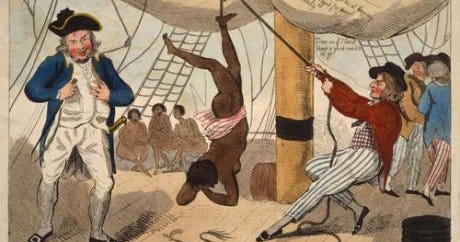 Slave transport between the 18th and 19th Century. Image credit: openDemocracy
Slave transport between the 18th and 19th Century. Image credit: openDemocracy
Transatlantic slave trade (15th to 19th centuries):
The mass enslavement and transportation of African people to Europe and the Americas marked a dark chapter in the history of racism. Millions of Africans were taken as slaves and made to endure harsh conditions and brutality, including dehumanisation, where slavery was justified by portraying Africans as inferior, less intelligent and less human than other races.
This portrait gave way to subjection to hard labour and sexual exploitation. Some scholars (Dr Kevin Hovind) believe the theory of evolution is at the root of this racial segregation, categorisation and colonisation.
Colonialism (16th to 20th centuries):
Colonialism played a significant role in shaping modern racism. The imposition of colonial rule involved the assortment of people based on race, leading to hierarchical structures. European colonial powers often justified their dominance by portraying colonised populations as inferior or less civilised.
This reinforcement of racial hierarchies contributed to the development and perpetuation of racist ideologies. Additionally, colonial powers exploited and oppressed indigenous populations, further reinforcing discriminatory attitudes and practices. The legacies of colonialism continue to influence contemporary issues related to race and inequality.
Abolitionist movements (18th to 19th centuries):
The abolition movements, particularly the movement to end slavery, shaped attitudes toward racism. By advocating for freedom and equal rights of enslaved individuals, these movements challenged the notion of racial superiority and fueled discussions about human rights and equality.
Apartheid in South Africa:
Apartheid was a system of institutionalised racial segregation and discrimination enforced by the government of South Africa from 1948 to 1994. It divided the population along racial lines, with the white minority enjoying superior rights and privileges at the expense of the black majority.
Jim Crow Laws in the United States:
Jim Crow laws were state and local laws in the United States that enforced racial segregation and discrimination against African Americans from the late 19th century until the mid-20th century. These laws perpetuated racial inequality and denied African Americans basic and essential civil rights and opportunities for advancement.
The Holocaust:
The holocaust was one of the saddest events in the history of race, migration and wars. Although many people believe it is not solely racial, the Holocaust perpetrated by Nazi Germany during World War II targeted Jews, Romans, and other groups based on racial and ethnic prejudice.
According to The Hitler Movement, races were categorised into Nordic (blond hair, blue eyes) — close to pure Aryan; Germanic (brown hair, blue eyes, less desirable brown eyes) — Predominantly Aryan; Mediterranean — Slightly Aryan; Slavic — close to half-Aryan, half-Ape; Oriental — Slight Ape preponderance; Black African — Predominantly Ape; Jewish (fiendish skull) — close to pure Ape. It resulted in the systematic genocide of millions of people and stands as one of the most horrifying examples of racism and bigotry in history.
These examples illustrate how racism has been deeply ingrained in social, political, and economic structures throughout history, leading to profound injustices and suffering for marginalised communities. Recognising and understanding these historical events is crucial for combating racism and promoting equality and justice.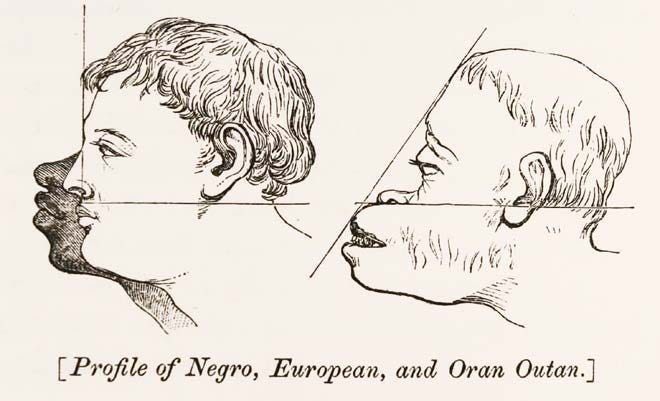 Racial stereotype of the Civil War era. Image credit: American Antiquarian Society
Racial stereotype of the Civil War era. Image credit: American Antiquarian Society
Some Worrisome Racism Comments and Events in History
- The standard intelligence of the average Negro is similar to that of the eleven-year-old youth of the species Homo sapiens — Henry Fairfield Osborn, Outspoken evolutionist and curator of natural history, New York
- America had a racist immigration policy before World War Two — Dr Kevin Hovind
- Biological arguments for racism may have been common before 1850, but they increased by orders of magnitude following the acceptance of evolutionary theory — Steven Jay Gould, Ontogeny and Phylogeny, pp 127–128, 1977.
- No rational man, conscious of the facts, believes that an average Negro (Black) is the equal, still less the superior of the white man — Thomas Huxley (Known as Darwin’s bulldog), 1871.
- The black people of Australia, the same race as the African Negro cannot take in the gospel… All attempts to bring them to a knowledge of the true God have as yet failed utterly. Poor brutes in human shape… They must perish off the face of the earth like brute beasts — Charles Kingsley (Anglican Priest) sermons on Natural Subjects, Sermon XLI pp. 414–17, 1880
- “I am haunted by the human chimpanzees I saw along that hundred miles of horrible country… to see white chimpanzees is dreadful; if they were black, one would feel it so much, but their skins, except where tanned by exposure, are as white as ours — Charles Kingsley in 1860 in a letter to his wife after visiting Ireland where the potato famine had just killed 1 million people in the country of 8 million.
- Negros in this life are denied the priesthood; under no circumstances can they hold this delegation of authority from the almighty. (Abra 1:20–27). The gospel message of salvation is not carried affirmatively to them… Negros are not equal with other races where the receipt of certain spiritual blessings are concerned, particularly the priesthood and the temple blessings that flow therefrom, but this inequality is not of man’s origin. It is the Lord’s doing, is based on his eternal laws of justice, and grows out of the lack of spiritual valiance of those concerned in their first estate — Mormon Doctrine by Bruce R. McConkie, 1966, pp. 527–528.
- “If there is one drop of Negro blood in my children, as I have read to you, they receive the curse” — Mormon Apostle Mark E. Petersen, Race Problems — As They Affect the Church, page 7
- “Shall I tell you the law of God concerning the African race? If the white man who belongs to the chosen seed mixes his blood with the seed of Cain, the penalty, under the law of God, is death on the spit. This will always be so” — Mormon President, Brigham Young, Journal of Discourses, Vol two, page 110.
- The mental life of savages rises little above that of the higher mammals, especially the apes, with which they are genealogically connected… their intelligence moves within the narrowest bounds, and one can no more (or less) speak of their reason than of that of the more intelligent animals… these lower races (such as Veddahs or Australian Negros) are psychologically nearer to the mammals (apes and dogs) than to civilised Europeans; we must therefore assign a different value to their lives — Ernst Haeckel, The Wonders of Life (New York: Harper, 1904), pg 56–57.
- A New South Wales missionary was a horrified witness to the slaughter by mounted police of a group of dozens of Aboriginal men, women and children. Forty-five heads were boiled down and the 10 best skulls were packed off for overseas. — Creation ex nihilo March 1996.
- “I have studied with great interest the laws of several American states concerning the prevention of reproduction by people whose progeny would, in all probability, be of no value or be injurious to the racial stock” — Adolf Hitler told a Nazi confidant. Discover Sept 2003, pg 77.
- “I wish very much that the wrong people could be prevented entirely from breeding.” He also thought that immigrants from Europe, Scotland, Ireland and the Orient were a threat to American Society — Theodore Roosevelt. Biology. Bob Jones University Press. P 160
- “A married man is a poor slave, worse than a Negro” — Charles Darwin. The Autobiography of Charles Darwin p. 234, Impact #249 from ICR 619–448–0900
- On Oct 3, 1935, Benito Mussolini, the fascist dictator of Italy, sent 100,000 Italian soldiers to attack Ethiopia from Eritrea without a declaration of war. Emperor Haile Selassie had about 500,000 men, many of whom were recruits armed with primitive weapons such as spears and bows. With tanks and aeroplanes, the Italians easily and mercilessly slaughtered the Ethiopians with spears.
- “A direct line runs from Darwin, through the father of the eugenics movement- Darwin’s cousin, Francis Galton- to the extermination camps of Nazi Europe.” — Martin Brookes, ‘Ripe Old Age,’ New Scientist 161(2171); 41, 1999.
- No more than nature desires the mating of weaker with stronger individuals even less does she desire the blending of a higher with a lower race. — Mein Kampf by Adolph Hitler. P. 286
- There is a difference between those who look upon their fellow human beings as a common creature of a common creator and those who look upon them as a conglomerate of biologicals and chemicals. — Jewish Dr. Leo Alexander in, It Can’t Happen Here… Focus on the Family. Aug, 1998. P. 12.
- A man told authorities he chose a plastic surgeon from the phone book and killed him because they, hairdressers and people who make blue-tinted contact lenses are diluting the Aryan beauty. Associated Press, Skokie, Illinois 8–10–93
- The Japanese were taught that they had evolved farther and were therefore superior to all other races. Japanese scientists ‘produced studies decrying the apish physical features of other races (hairiness, long arms) and noted the highly evolved characteristics of the Japanese’ (which included milder body odour). — Time Australia, Aug 14, 1995. P. 83
- Bataan Death March in April 1942 (WW2) — The Japanese treated American and British prisoners horribly because they thought they were an inferior species.
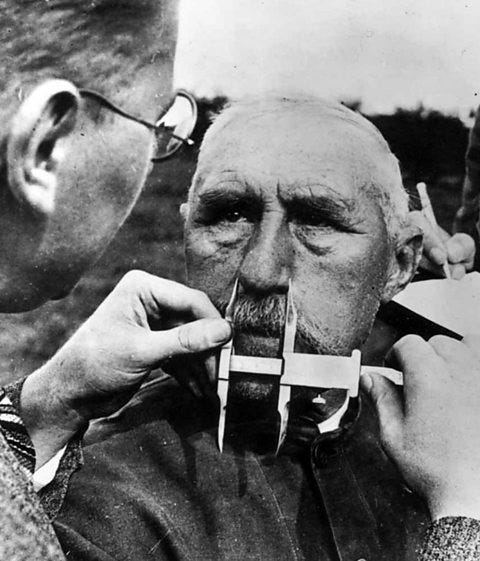 Racial categorization, 1939. Image credit: BBC
Racial categorization, 1939. Image credit: BBC
Racism and Discrimination in the 21st Century.
The 21st century is the most advanced in all aspects of human life and existence: medicine, engineering, science, technology, mining, finance, marketing and so on. This century has learnt to avoid many social issues of the previous hundreds of years, except racism.
Although the century is trying to eliminate discrimination with foreign policies, international diplomatic relationships and dialogues, and social judgement of racial abuse, there are subtle undertones of racial preference and treatment in labour, marketing and marriage.
It is disturbing to find that racism continues to thrive in the most progressive and enlightened century in the history of humankind. Many reports of racial discrimination are everywhere, especially on social media, from the Arab world in the East to the African communities and Western civilisations.
In Qatar, for example, there are allegations of racial discrimination and segregation of immigrant workers during the country’s preparation for the 2022 World Cup competition. Reports allege that the workers were treated unfairly and prevented access to many parts of the city they work in. It went further to accuse the Qatari government of enforcing a racial and strict routine and treatment of immigrant workers.
The Democratic Republic of Congo, in 2024, is still remitting colonial dues to France. The racist treatment from the colonial era lingers into the 21st century, long after empires began to grant independence to the territories they colonised.
Pablo is a Mexican name that is always associated with drug dealing, cultism and crime. Juan, Isabella and Maria are other Mexican names associated with workaholics in menial jobs like electrician, housemaid, hotel room service provider, painter, gardener, prostitute, etc. These names are racial stereotypes that people, especially Americans, loosely use to taunt Mexicans.
According to the Pew Research Centre, roughly six in ten black Americans (61%) say they have personally experienced discrimination or been treated unfairly because of their race or ethnicity, including 11% who say this is something they experience regularly. A far lower share of whites (30%) and Hispanics (52%) report experiencing discrimination because of their race or ethnicity.
In total, four in ten black Americans say their race or ethnicity has made it harder for them to succeed in life. When questioned about specific kinds of discrimination that people may face, about half of black adults said that in the past year, someone has acted as if they were suspicious of them (47%) or as if they thought they were not smart (45%).
About two in ten blacks say they were treated unfairly in hiring, pay or promotion over the past year (21%), and a similar share (18%) say they have been unfairly stopped by the police over the same period. In each of these cases, blacks are more likely than both whites and Hispanics to say they have experienced these things in past years.
Incidents of racism in the 21st century have persisted across various regions despite significant progress in raising awareness and advocating for equality. Notable examples include:
- The death of George Floyd (2020): A very well-known incident which screams racism was the death of George Floyd, an African-American who died on the 25th of May, 2020, in Minneapolis, Minnesota, USA. George was apprehended by the police, and one officer, Derek Chauvin, pinned him to the ground by kneeling on his neck for about nine minutes despite Floyd’s repeated pleas that he couldn’t breathe. This incident gained global attention and sparked widespread protests (Black Lives Matter) against police brutality and racial injustice.
- Breonna Taylor shooting (2020): Breonna Taylor, a young black woman, was shot and killed by police officers during a botched raid on her apartment in Louisville, Kentucky. The case raised concerns about police use of force, racial bias in law enforcement and the lack of accountability for officers involved in fatal shootings.
- Ahmad Arbery shooting (2020): Ahmaud Arbery, an unarmed African American man, was pursued and fatally shot while jogging in Glynn County, Georgia. The incident sparked outrage and renewed discussions about racial profiling and vigilante violence.
- Central Park birdwatcher confrontation (2020): A video went viral showing a white woman, Amy Cooper, calling the police on Christian Cooper, a black birdwatcher, falsely accusing him of threatening her in New York City Central Park. The incident underscored the dangers of weaponising race in public spaces.
- Asian hate crimes during the COVID-19 pandemic: The COVID-19 pandemic exacerbated anti-Asian sentiments, ushering a surge in hate crimes and discrimination against people of Asian descent worldwide. Incidents range from verbal harassment to physical assaults reflecting deep-seated xenophobia and racism.
- The movie and game industries, especially Hollywood, face constant backlash for their casting choices in movies that are genomic to a culture or people. Although the franchises are seeking political correctness by sometimes casting a black in a historical movie of Whites or Asians, they end up adding salt to the injury and often suffer backlashes and boycotts of their movies. Examples include the casting in The Little Mermaid (2022), The Rings of Power (Season one, 2022), and recently, the new lead casting for a 7th-century lady pirate in the Pirates of the Caribbean Franchise (2024).
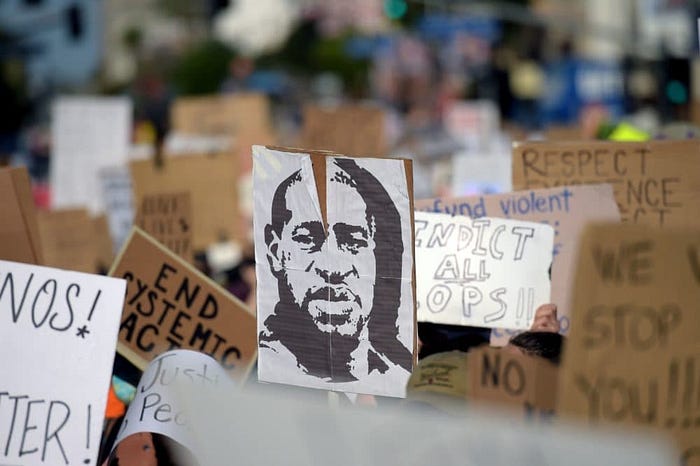 Black Lives Matter Protest following the death of George Floyd in 2020. Image credit: WBUR
Black Lives Matter Protest following the death of George Floyd in 2020. Image credit: WBUR
These incidents illustrate the persistent challenges of racism and discrimination in the 21st century across various communities and social contexts. They emphasise the need for continuous efforts to address systemic inequities and promote inclusivity and respect for diversity.
Migration
The relationship between migration and racism is complex and multifaceted. While migration itself does not inherently facilitate racism, the interaction between different cultural, ethnic and racial groups during migration can sometimes contribute to the emergence of exacerbation of racist attitudes.
Cross-border interactions of people in search of better living condition and their newfound economic solution are often the breeding ground for racist abuse and maltreatment.
Different countries have different challenges, and what seems to be in abundance in one country is less or absent in some others. Migration is a part of the natural rule of survival. Animals migrate in search of food and water, and so do humans, in search of a ‘better today,’ and a possibly greater tomorrow.
Stopping immigration into a country may seem like the most effective way to curb racial discrimination. After all, you can not racially abuse someone you have not met or seen. However, it creates an imbalanced society. Many of the immigrants possess some of the key elements to further economic breakthrough, especially labour.
Migration has increased existing racial tensions and prejudices, leading to racism against migrant communities in various ways, often rooted in fear, ignorance and economic competition. Migration has contributed to racism in many ways including;
- Competition for resources: When migrants move to a new area, they compete with existing residents for jobs, housing, basic amenities and social resources. This competition has led to resentment and prejudice towards migrants, especially if they are perceived as taking opportunities away from native-born residents if there are limited resources available.
- Cultural differences: Migrants often bring their cultural practices, languages and traditions with them, which can clash with those of the host society. Thus, a clash of cultures can fuel xenophobia as some people may view the cultural differences as threatening or inferior.
- Stereotyping: Migrants are subjected to negative stereotypes and prejudice based on their racial or ethnic backgrounds. These stereotypes can be perpetuated by media, politicians and other influential figures, leading to discrimination against migrant communities.
- Fear of change: Migration can disrupt social norms and established communities, leading to fear and resistance to change. This fear of the unknown can manifest as racism and discrimination towards migrants as people may perceive them as a threat to the status quo.
- Historical factors: Historical events such as colonisation, slavery and imperialism have contributed to racism towards certain racial and ethnic groups. Migration patterns often reflect these historical injustices, leading to entrenched discrimination and inequality.
- Political exploitation: Politicians sometimes exploit anti-immigrant sentiment for their gain, using inflammatory rhetoric or enacting discriminatory policies to appeal to certain voter demographics. This can intensify existing racial tensions and fuel discrimination against migrants.
Factors Facilitating Migration.
Migration can intersect with racism in several ways, both in terms of how migrants are perceived and treated within host societies and how racial biases may influence migration policies.
It is a complex phenomenon influenced by various factors, including;
- Economic Factors: Economic disparities between regions and countries are the leading factor or reason for migration in the 21st century. People migrate for better job opportunities, higher wages and improved living standards. This emigration is mostly resulting from the brain drain in their country of residence or birth. Economic factors may include poverty, unemployment, lack of economic opportunities, disparities in wealth distribution, etc.
- Political factors: Political instability, persecution, conflict and human rights violations can force people to flee their home countries. Political refugees seek safety in other countries to escape persecution or violence perpetrated by government and non-state actors.
- Social factors: Social factors such as discrimination, marginalisation and social unrest can contribute to migration. Discrimination based on race, ethnicity, religion, gender or sexual orientation can push individuals or groups to seek refuge in countries where they hope to find greater acceptance and opportunities for social inclusion.
- Environmental factors: Environmental factors including natural disasters, climate change and environmental degradation can disrupt livelihoods and force people to migrate. Rising sea levels, droughts, floods and other extreme weather events can destroy crops, homes and infrastructure, leading to displacement and migration.
- Conflict and violence: Armed conflict, civil unrest and violence contribute significantly to migration. People flee conflict zones to escape the dangers of war and violence often seeking safety in neighbouring countries and regions.
- Demographic factors: Demographic factors such as population growth, urbanisation and demographic imbalances can influence migration patterns. In some cases, high population density and limited resources can drive people to seek opportunities elsewhere.
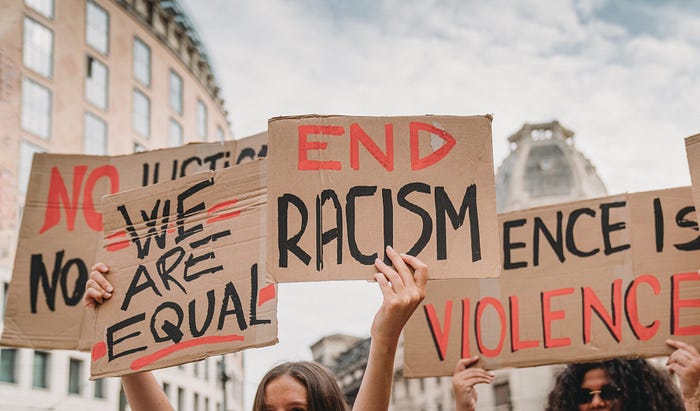 Image credit: University of Manchester
Image credit: University of Manchester
Care: Foreign Policies Against Racism.
One of the most effective ways to deal with racism or stamp it out, aside from encouraging and facilitating economic stability in countries people emigrate from, is a ‘strong’ foreign policy. This policy gives a nation the right and ability to interfere in the discrimination of her people residing in other countries.
If countries institute and implement anti-racial policies and stand firmly on their rights to protect their people from racist treatment, then lamentations of racial abuse will begin to die.
However, foreign policies concerning racism vary from country to country and are influenced by historical, cultural, and political factors. Some common approaches to addressing racism in a foreign policy include;
- Diplomatic Efforts: Many countries engage in diplomatic initiatives aimed at promoting equality, diversity, and tolerance on the global stage. This can involve supporting international conventions and agreements that combat racism, discrimination, and xenophobia.
- Aid and Development Programs: Foreign aid and development assistance may be directed towards initiatives that promote social justice, human rights, and anti-racism efforts in other countries. This can include funding for education, healthcare, and economic development programs that aim to address the root causes of racism and inequality.
- Multilateral Cooperation: Countries often collaborate with international organisations such as the United Nations, the European Union, or regional bodies to develop and implement strategies for combating racism and promoting equality on a global scale. This can involve participating in conferences, summits, and working groups focused on anti-racism initiatives.
- Trade and Economic Policies: Some countries incorporate anti-racism objectives into their trade and economic policies by promoting fair labour practices, combating discrimination in the workplace, and supporting businesses owned by marginalised communities both domestically and abroad.
- Cultural Exchange and Public Diplomacy: Cultural exchange programs, public diplomacy initiatives, and international outreach efforts can be used to promote cross-cultural understanding, diversity, and tolerance. This may involve supporting cultural exchanges, promoting intercultural dialogue, and showcasing diverse perspectives through media, arts, and educational exchanges.
- History: The international communities and member states can also mandate the subject of history for their citizens at all levels of education. This will facilitate knowledge and guide the younger people wherever they are. If the children of the colonial countries learn what happened and how terrible it turned out, there may be a consequent respectful treatment of people who descend from the colonised areas.
Conclusion
Racism in the 21st century is a cancerous affliction that is proving difficult to deal with. We can blame colonisation and the teachings of evolution for the lives and livelihoods that have been lost over the years, it does not dilute the fact that countries need to come together and design policies to stamp out the disease.






































